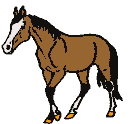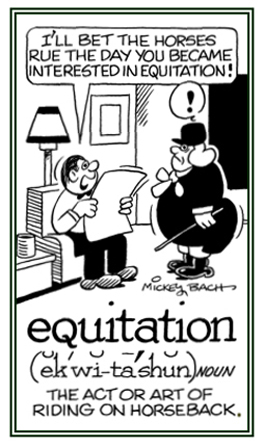equ-, eque-, equi-
(Latin: horse)
Don't confuse this unit with another equ- unit meaning same, equal.
"Scientists have sequenced the oldest genome to date—and shaken up the horse family tree in the process. Ancient DNA derived from a horse fossil that's between 560,000 and 780,000 years old suggests that all living equids—members of the family that includes horses, donkeys, and zebras—shared a common ancestor that lived at least 4 million years ago, approximately 2 million years earlier than most previous estimates."
"The discovery offers new insights into equine evolution and raises the prospect of recovering and exploring older DNA than previously thought possible."
2.Therapy programs that focus primarily on horse handling, riding techniques, and on the therapeutic benefits of the relationships between the "patients" and the horses.
Riding horses for therapeutic purposes has helped children with a very wide range of disabilities, including Autism Spectrum Disorder, substance abuse, Multiple Sclerosis, Muscular Dystrophy, amputation, developmental disorders, spinal cord injury, brain injury, Cerebral Palsy, seizure disorders, visual and hearing impairment, learning disorders, emotional problems, anxiety disorder, behavioral problems, and other problems.
Equine therapy is founded on the principle that, through working with horses, students can learn life skills that initiate change.
All aspects of horses and horsemanship are used in the program, from bareback riding, to jumping, to barrel racing, to young horse training.
Horsemanship skills are integrated with team building activities, experiential learning, and therapy groups to create a variety of beneficial programs.
Riding horses improves muscle tone, balance, posture, motor coordination, concentration, self-confidence, and self-esteem according to the those who are involved with equine therapy.
2. Of or belonging to the family Equidae, which includes the horses, asses, and zebras.

2. Etymology: from Latin equitation which came from equitare, "to ride a horse".

